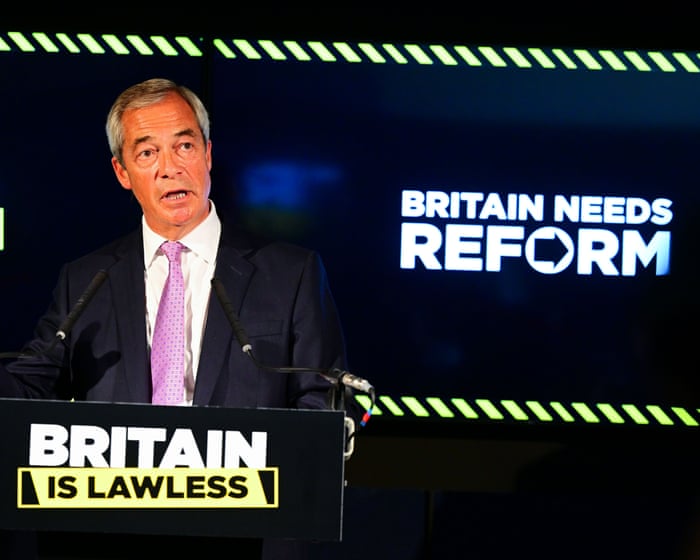During last year’s general election campaign, Reform UK adopted “Britain is broken” as its slogan. This summer, aiming to dominate headlines during the long parliamentary recess, Nigel Farage has escalated his alarmist rhetoric. The message has shifted from “broken” to “lawless,” echoing Donald Trump’s “American carnage” speech from his 2017 inauguration.
Farage has casually made unfounded claims about soaring crime rates to support his argument that Britain faces “nothing short of societal collapse.” In a recent Daily Mail article, he claimed that street-level lawlessness is worsening due to the government allowing “droves of unvetted men into our towns and cities.” Commenting on protests outside an Epping hotel housing asylum seekers—after a resident was charged with sexually assaulting a local teenager—he warned the country was nearing “civil disobedience on a vast scale.”
Yet official crime data tells a different story. The Crime Survey for England and Wales, the most reliable source, shows theft, vandalism, and violent crime have declined steadily since the 1990s. Farage ignores these facts, preferring to stoke fear rather than engage with evidence. His goal is to paint a picture of a nation where detached elites ignore an immigration-linked crime wave, creating demand for the authoritarian solutions he promotes.
Reform UK’s recent pledge to repeal the Online Safety Act—announced at a “Britain is lawless” press conference—shows its willingness to risk further poisoning public debate with misinformation and hate speech. Essex’s police chief recently rebuked Farage for falsely claiming officers had escorted counter-protesters to the Epping hotel, highlighting how inflammatory rhetoric has real-world consequences. Asylum seekers in the area have reported being chased and attacked, mirroring last summer’s unrest after the tragic Southport murders. Far-right groups are exploiting tensions, hoping to spark wider conflict.
While these trends are concerning, Britain is not descending into chaos or civil war. Most citizens supported tough measures against past disorder, and Deputy PM Angela Rayner rightly stressed the need for greater social cohesion in struggling communities.
Farage’s exaggerated claims aim to inflame tensions, not resolve them. For a party claiming mainstream legitimacy, stoking fear and anger is reckless. Britain is far from becoming Trump’s America, and Reform’s cynical tactics may backfire. But they serve as another reminder of the divisive core of Farage’s politics.
Would you like to share your views on this topic? You can submit a letter (up to 300 words) for possible publication in our letters section by clicking here.



